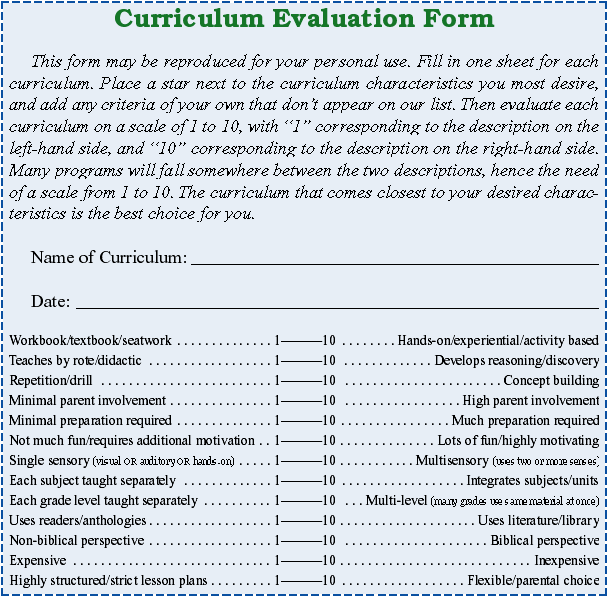 The musical Paint Your Wagon contains a song that tells us the manner in
which many parents start homeschooling. The verse begins, “Where are you
going? I don’t know. When will you got there? I ain’t certain. All that
I know is I am on my way.”
The musical Paint Your Wagon contains a song that tells us the manner in
which many parents start homeschooling. The verse begins, “Where are you
going? I don’t know. When will you got there? I ain’t certain. All that
I know is I am on my way.”
Ready or not, many homeschoolers begin teaching who knows what, going
who knows where. Have you ever tried to play a football without a game
plan or build a house without blueprints? It is equally impossible to
train children without first establishing goals and then establishing
the means to achieve those goals.
Certain about their primary function to raise a godly seed with
excellent character, most Christian homeschoolers place equal emphasis
on excellent academics for their children. Parents have some real-world
concerns, such as, “Will my child score high on the SAT, get into
college, or hold down a job?”
Basically, parents want their children to succeed by making the most of
the talents the Lord has given them. But how does one build toward that
success?
LISTEN TO THE EXPERTS
Before we can listen to “the experts,” we must identify the experts.
True experts are people who have homeschooled with reasonable success
and seem to have wisdom and philosophy to share.
However, like most movements, homeschooling has its own brand of
self-appointed “experts.” These people live in distant towns, write down
anything they please, and charge large sums of money for their
“expertise.” Each “expert” claims to possess the best way to teach
children. One touts higher scores on standardized tests while another
provides a list of ways to keep your daughter pure. Still another
assures children will love learning only if the hands-on approach is
used.
So to whom do we listen? They can’t all be right—or can they?
Most methods do contain some truth. That’s why you should read
extensively about the differing home schooling approaches and
philosophies, constantly comparing what they read. Amazingly, many
parents purchase curriculum without even considering the philosophy
behind the curriculum. After comparing the differing philosophies, then
ask, “What are the goals this expert seeks to attain using this method?
Are these the same goals I have for my children?”
LISTEN TO YOUR INSTINCTS
By just being a parent, you know enough to say, “I wish I had been
taught like that,” or, “My child would love learning this way.” Certain
curriculums evoke immediate heart-felt responses. For success, read what
others have to say, sift through the information, make a choice, and
trust your instincts. But remember, before instincts can be crystal
clear, extensive research must be done.
If homeschooling were packaged, it would read, “Danger! Do NOT start
until ready.” Parents and children are better served if children read
one library book after another for two months while parents decide which
curriculum to use. Numerous parents who have spent large sums of money
on curriculum that does not work for their child, yet refuse to chuck it
because it was expensive, will tell you, “Better to start late on the
right road than to take the wrong road altogether.”
LISTEN TO YOUR CHILDREN
Treat each child as a unique individual. The beauty of homeschooling and
the tutorial method is that you can tailor curriculum to each child’s
needs. Not every child needs auto mechanics, animal husbandry, or
calculus. Excellent teachers respond to a child and his needs rather
than being driven by a curriculum or method. You should constantly
evaluate what works with each child.
A friend of mine, Kathy von Duyke, tells the story of a professor who
noticed that his students were more attentive if he stood near a vent in
the room than if he stood at the front of the room. The professor,
therefore, responded to his students and ended up lecturing sitting on
the vent, because it worked. Small things like recognizing that a child
learns more if he holds the book himself than if a parent holds the book
help us respond effectively to each individual child. If it works, keep
it. If it does not work, shelve it and try it in a different season.
LISTEN TO YOUR LIFE’S SITUATION
We should, however, consider more than just the child. Homeschooling
takes place in the home and must work for all those involved. A wise
parent evaluates himself as a teacher, his child as a learner, and the
family’s situation at that particular time and then chooses the
curriculum that works best.
 Just as children need different sized clothing as they grow and
different kinds of clothing as the seasons change, so too curriculum
must adjust with changes in time and situation. High school children who
have previously learned in an integrated, unit fashion may move toward a
more traditional approach of studying subject-by-subject while
continuing to integrate a few subjects where applicable. Likewise,
families who have high-stress years may find it helpful to employ a more
structured, self-taught curriculum to relieve a parent of constant
involvement. Other years a unit approach allows the entire family to
learn and grow together.
Just as children need different sized clothing as they grow and
different kinds of clothing as the seasons change, so too curriculum
must adjust with changes in time and situation. High school children who
have previously learned in an integrated, unit fashion may move toward a
more traditional approach of studying subject-by-subject while
continuing to integrate a few subjects where applicable. Likewise,
families who have high-stress years may find it helpful to employ a more
structured, self-taught curriculum to relieve a parent of constant
involvement. Other years a unit approach allows the entire family to
learn and grow together.
Success in homeschooling is directly proportional to the amount of
research you do and your ability to evaluate all the elements of your
homeschool—your goals, your students, you as the teacher, your life
situation, and your curriculum. All elements must work together for
homeschooling to be successful.
The chart below will help you objectively evaluate curriculum and then
choose the curriculum that best meets the needs of your children and
your life situation. When your curriculum fits your family and your
family’s situation, success is assured.